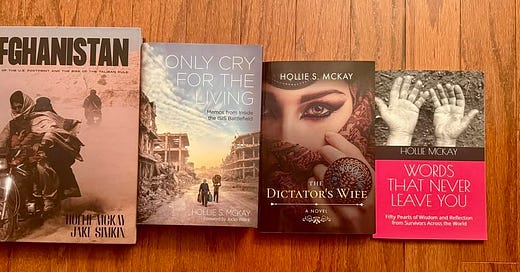I can’t stop thinking about the images coming out of Texas. It’s a depth of tragedy so shocking and painful I cannot even begin to imagine the process what so many families are going through right now. My brain almost shuts off at the terrifying thought.
Water swallowing homes like a cruel tide. Mothers carrying crying toddlers across submerged highways. Family pets clinging to floating furniture. Lives upended in an instant—swept into the chaos of flash floods that struck with terrifying speed on what was supposed to be a joyful holiday, July 4.
And so I keep squeezing my daughter a little tighter. Because when nature lashes out, it doesn’t pause for fireworks, or family barbecues, or summer picnics. It doesn’t wait for us to be ready. She is the one victor we can never conquer.
What has unfolded across parts of Texas in recent days is nothing short of a nightmare. Entire communities have been washed out, roadways erased, homes and summer camps drowned in muddy torrents, and dreams destroyed. Some people lost everything, including all their children. Others are still missing. Families have been left standing in debris piles, the skeletal remains of what were once places of warmth and memory.
But what I keep coming back to—what gives me breath in the middle of all this pain—is the quiet, relentless bravery of the first responders.
These are the people who ran into the storm. Firefighters, sheriff’s deputies, paramedics, volunteer rescue teams—ordinary men and women who put on boots, climbed into boats, and pulled strangers from the rising water. They didn’t stop when the rain kept falling. They didn’t rest when the sun went down. And they didn’t ask who someone voted for, or how much money they had. They just went.
They keep going.
There are no words big enough to encompass the weight of what they’ve done. But we must try. We must honor them by remembering. By helping. By not looking away now that the floodwaters are receding.
The trauma will outlast the headlines. The cleanup will stretch for months, if not longer. What’s been lost is irreplaceable: heirlooms, childhood drawings, wedding photos, sacred spaces, a sense of safety. Some of the most devastated areas—like Kerr County, where rivers turned violent and entire blocks were swept downstream—are only just beginning to assess the damage.
I feel guilty for moving on with my daily life many miles away when I know so many fellow Americans are hurting. It feels almost wrong to enjoy the comforts of a dry home and predictable routine when countless families have lost everything, their lives upended in an instant. It’s the classic case of bystander’s guilt. The images of submerged homes and desperate faces on the news create a powerful, unsettling proximity, making it impossible to truly disconnect.
This discomfort, though unwelcome, is a potent reminder of our shared humanity. It's the empathy that binds us, even across state and international lines. While the scale of the disaster can make individual efforts feel insignificant, this very feeling of guilt can be a catalyst. It pushes us to acknowledge the ongoing suffering long after the initial headlines fade, urging us to find ways to support relief efforts and advocate for more resilient communities.
Our ability to feel this collective ache, even when personally untouched, is a crucial ingredient for a compassionate society – one that recognizes no American is truly an island when disaster strikes.
If you’re wondering what you can do, start here. These organizations are actively supporting victims and responders in the flood zones:
Kerr County Flood Relief Fund – Helping directly impacted families with emergency needs.
www.kerrvillefloodrelief.orgTexas Search and Rescue (TEXSAR) – A volunteer-based team conducting swift water rescues.
www.texsar.orgWorld Central Kitchen – Providing hot meals to evacuees, rescue crews, and local responders.
www.wck.orgAustin Disaster Relief Network (ADRN) – Supporting families with emergency shelter, clothing, and trauma care.
www.adrn.orgTeam Rubicon – Mobilizing veteran-led disaster response teams for cleanup and rebuilding.
www.teamrubiconusa.orgFeeding Texas – Making sure food banks stay stocked and accessible.
www.feedingtexas.orgAmerican Red Cross – Central & South Texas Chapter – Offering emergency lodging, supplies, and reunification.
www.redcross.orgSamaritan’s Purse – deploying disaster relief and working with emergency responders to assess the greatest needs
www.samaritanspurse.org/
Baby2Baby – supplying diapers, clothing, and all the basic necessities for families in need
baby2baby.org/
Each of these groups is on the ground right now, bringing food, blankets, medicine, fuel, and hope to people who have lost so much. For the best, up-to-the-minute news coverage checks out my good friend Jenna Lee’s @SmartHerNews on Instagram and SmartHerNews.com.
Let’s give. Let’s remember. Let’s stand behind the first responders who gave everything—and the families who still need so much more.
PLEASE CONSIDER A PAID SUBSCRIPTION TO THIS SUBSTACK TO HELP KEEP INDEPENDENT, AGENDA-FREE WRITING AND JOURNALISM ALIVE. THANK YOU SO MUCH FOR YOUR SUPPORT.
For speaking queries please contact meta@metaspeakers.org
For ghostwriting, personalized mentoring or other writing/work-related queries please contact hollie@holliemckay.com
Follow me on Instagram and Twitter for more updates
Click to Purchase All Books Here





We live just an hour's drive from Kerrville and the Guadalupe River runs through our city. As of this morning over 100 bodies have been recovered - it's heartbreaking. Thanks for acknowledging the first responders who, as you said run into danger, as well as the army of volunteers who are housing, feeding, and transporting them. Also among the volunteers are people who came to help clean up and care for the victims. Grateful for them.
My attention had already moved on from this so thank you for bringing it back to our friends in Texas. My family will donate funds today.